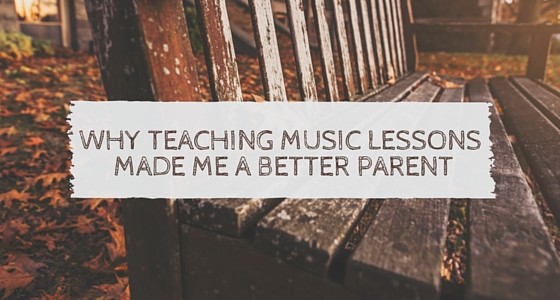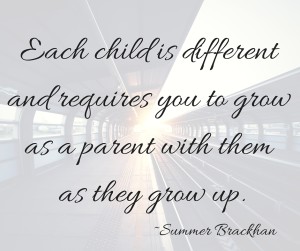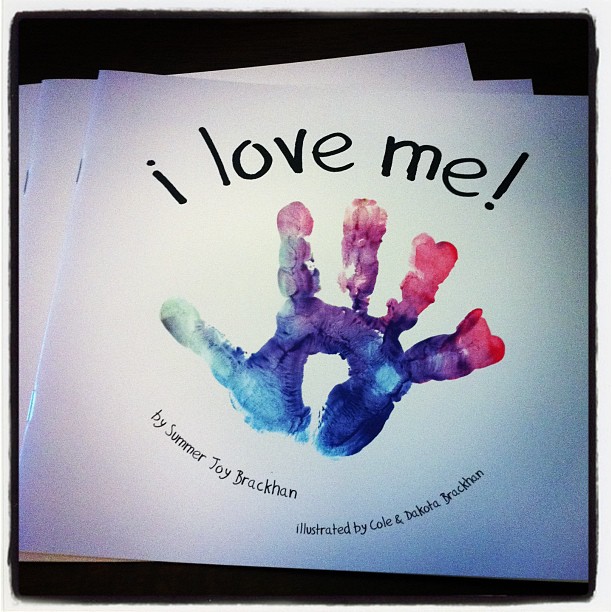When I first started teaching violin lessons, I never imagined it would make me a better parent. What I learned blew me away at first, but now it feels like home.
While people continue to debate nature verses nurture, the kids have taught me that it’s all about the parent. The impact a parent’s personality, lifestyle and parenting style has on their child is so painfully obvious that I (like most private music teachers I know) can tell a parenting style and the personality of the parent in pretty much one lesson (or even in the first few minutes of a phone call.)
Parenting doesn’t come with a big ol’ handbook and it is true that there isn’t one right way all the time because every child is different, BUT how you parent your child makes a difference how they turn out…hands down.
Here are 21 things I learned about kids and parenting through years of teaching violin lessons every week.
1. Habits, not circumstances, make up our lives. Circumstances happen, but the reaction to these circumstances is from the habits of our daily lives. i.e. In my violin studio, the parents who feel rushed and that their lives are out of control, are always late to lessons and half the time forget to pay on time. The families that pay for lessons before it is even due, have kids who are well prepared in lessons and life.
2. Every child learns differently. Some kids are visual learners, others are tactile, some are auditory and others just need time. No one method, no matter how good it is, works for all kids. (This is where schools are failing our kids. Schools usually specialize in one style of learning…but that is another blog post subject.) While I teach violin through the auditory focused Suzuki method, kids who are visual need to see the notes or rhythms in order to process efficiently. For visual kids I write the rhythm on the board first, then I play the music. This is always more successful then me only playing it.
3. All kids are fast learners, IF you teach to their learning style. There is no such thing as a slow kid. Yes, kids process things at different speeds, but if a kid is really into something and engaged, they will learn at lightening speed.
4. Kids appreciate feedback. Kids naturally want to excel and do their best. They understand the concept that you need to make corrections along the way to get better. Kids are ok with getting guidance on how something could be improved, they understand that is part of the process and are willing to make the correction to reach their goal. It’s the adults who are afraid of critique that teach their kids to fear feedback. In lessons if Suzie plays through a piece of music and is struggling on a particular measure she wants feed back of what to change. As a teacher, I give her guidance into how to change the speed of her bow to make it easier to play the measure. She tries playing the measure again with a faster bow speed. It works. Suzie is thrilled.
5. Compliment first, then correct. This is huge!!!!!!! When you compliment you psychologically put someone in a safe place. Then they are more open to change and ready to improve. This is sooooo important!!! In violin lessons I always look for something the child is doing well before I launch into what they need to improve. At home, do the same. If your child needs guidance, compliment them on what is working then tackle what isn’t working. i.e. “Johnny, you really were careful in playing with your toys, now let’s pick them up.” OR “I know you really care about your sibling, now let’s figure out how to work this disagreement out.”
6. Be clear with goals and expectations. When kids know what you expect from them, then they can figure out how to work towards that goal. If you never set clear expectations, kids will assume anything goes (this is where poor or lazy behavior can creep in.) I let my students know that we might have to play something 10 times to get the right notes. If they complain I remind them that the reason why they came to lessons is to learn how to play violin and that repetition is part of the process. On the other hand, when a student is confused about what to do, it is always because I have not been clear enough in my explanation.
5. Give kids a voice. So many times adults push things that kids don’t have as goals, this is where anxiety creeps in… Ask your kids questions and you will have a much better idea of how to support them. I always ask students what type of violinist they want to be. Good? Great? Amazing? Ok? Not every kid wants to be amazing. Some just want to be able to play music in orchestra without getting lost. Knowing what their goals are enables me to help them the most. Imagine if I was pushing a kid to play perfectly if all they wanted to do was not get lost in orchestra class?
6. Words matter. The language you use is a reflection of your inner dialogue. I will never forget the time I set up two music recitals in two different cities at retirement homes. One establishment was excited to have the recital to share with their retirees, they used words such as “this will be great” and “fabulous”. The conversation was short and quick. The other establishment said, “You can come, but I fear that you might bring a cold that will get our residents sick.” They used the word fear about 15 times in the long 30 minute conversation. Kids pick up on our word choices way more than adults do. Adults are very careless with their words. Kids think words are gold. Why wouldn’t they? When they were learning to talk we made a VERY big deal out of every word.
7. iPads, video games and tons of TV are detrimental to kids development. This one is painfully obvious as a teacher one-on-one with kids. Kids who play on the iPad, video games, etc. have really poor attention spans. They cannot sit still, they interrupt (most often to tell you about their favorite video game), they emotionally break down in lessons, they want to be entertained or they dislike working. It is so obvious that when I have students who are calm, focus well, are willing to engage in repetitive tasks and have good attention spans, I have gotten in the habit of asking their parents how much electronic time they get. The answer is always the same, “Oh, we don’t have TV.” or “We don’t let them play video games.” or “Electronics very limited.”
8. Rhythm and patterns are soothing to kids. Our bodies have a natural rhythmic pattern and too often we forget this. Our heart beats in a rhythm,, we walk and breathe at a certain pace. In violin lessons if a kid is all over the place in lessons, I will get out rhythm sticks and we play a basic beat pattern over and over. They always calm down. At home with my kids, if we are all feeling off center, I will put on music with a really good beat and everyone magically is better.
9. If you talk softly, kids will listen better. When I really want a young child to understand something in a violin lesson, I almost whisper it. They will always lean in and take it more seriously. Also, if they are having a continued behavior issue after I calmly, but firmly, addressed it, I will whisper, “No thank you. Let’s not do that. Let’s see if we can focus again.” This works without fail. I always cringe when a parent yells louder at their kids to get them to listen. This just shows the child that the parent is out of control. Kids start to tune out the yelling as a way to naturally re-center themselves.
10. Kids like structure. Structure makes sense. When a students begins a lesson they know I am going to ask them to play a particular piece or measure. The kids appreciate knowing how the lesson will progress. Sure, we have to be flexible, but imagine what it would be like if I just sat there and waited for the child to tell me what they wanted to do in the violin lesson or followed them around? So many parents are afraid of breaking their child’s spirit by having some sort of structure, that they let the child run the house and then get super overwhelmed by their kids and schedule. These kids then come to lessons expecting to run the lesson…
11. Embrace mistakes with laughter. Mistakes are natural and a huge part of life. Help your kids to see that mistakes are simply a way to see where to grow. When a student makes a mistake in a lesson I don’t make a big deal out of it. We laugh and often I say, “Whew! That was wild, let’s try that again.” If mistakes are seen as not a big deal, then kids will not become anxious over them.
12. If kids are anxious, just breath. If a student is getting anxious or frustrated over something, I simply take a deep breath and naturally they will follow. I don’t join in their anxiety, but rather give them space to relax.
13. Excuses make more excuses. When a parent tells me their kids is tired, or “going through a phase” or any other excuse, they just let their kid off the hook for good behavior and gave their child an excuse to act poor. Their kid will then proceed to give me a bunch of excuses why something didn’t work. This excuses become part of the habit of everything in life. (see #1 above)
14. If a parent tells me their child is gifted, it is not good. A few weeks ago I heard an interview with Dr. Shefali, a psychologist, who said that when parents tell her their child is gifted she thinks “DOOMED” I laughed out loud when I heard this as it is so true. Parents who over inflate their kid’s abilities or need to boast publicly get more mileage out of the action for themselves then the kids do. The kids think that they don’t need to work because the parent has granted them genius status. It always backfires.
15. Listen to the small stuff, it’s all big stuff to the kids. Kids will tell you what is on their heart. Sometimes music lessons feel like a therapy session as kids tell me so much about their lives. I hear about what is happening at school, at home, at sports etc. When kids share it is part of how they process their emotions. I don’t say anything one way or the other, but say, “hmmm..interesting.” or “Thanks for sharing.”
16. If you make a mistake, be honest about it. So many adults make the mistake of pretending they are perfect. I make tons of mistakes in lessons. I play the wrong note or wrong bowing, etc. I always laugh and say, “Sorry, I made a mistake.” Kids are happy to have such honesty. When adults think they are covering up a mistake, they are only fooling themselves and teaching kids to bluff and not be honest. Drop the ego, your kids will be better for it.
17. Don’t sugar coat anything, it ruins trust. My students know I am honest and if something doesn’t sound good I will say, “That was a little rough. Let’s try it again” Since I am in the habit of complimenting first before I critique, sometimes I go on automatic pilot and say, “Good.” The student always turns to me with raised eyebrows as if to say – You’re kidding me right? That stunk. Kids know the truth, you might as well give it to them.
18. Food or big material incentives are bad shortcuts. There are always that fair share of parents who reward their kids with an ice cream cone if they behave well in the music lesson. This takes away a child’s sense of pride for good behavior and instead focuses on – you do what I want and I will give you what you want. Unconscious manipulation at it’s best. Plus it makes it 10 times harder down the road for the parent, kids and people the kids work with.
19. Work through the tough times. At some point, every child wants to quit violin. It is really hard. No one is immune to wanting to quit. However, the kids that stick with it learn one of life’s most valuable lessons – you are capable of more than you think. They also learn a ton of skills along the way like patience, problem solving, how to create small steps to get to the big goal (aka life is about the journey to the destination as well.) and confidence. Last fall my son surprised me when he said that he is grateful for work, read here why.
20. Throw away the rules sometimes. As a violin teacher, parents pay me for their kids to learn how to play violin. Sometimes I have to just forget all the “rules” of playing violin and just have fun. There are days when kids come in bogged down with school or a social situation that is bothering them and instead of keeping up with the rule of learning violin, we just forget it all and get lost in the art of the present moment by playing duets, playing a music game or listening to music. In a world that too often demands that kids do something a certain way, sometimes it is nice to just be.
21. Confidence means understanding you don’t know it all, but you go ahead anyway. Little kids are great at this. They will try and try and try, even if they don’t have all the answers. Little kids understand that confidence comes from reaching a goal after a thousand tries. Kids understand that confidence comes from BUILDING skills, not inherently having talents. It’s the adults the jump in nervously when things don’t go right at first. Give your child many opportunities to build skills. Don’t jump in and do thing for them. Let them struggle. Let them problem solve. Let them figure it out. In the end, they will be more confident for it because they will have learned how to problem solve, not just put a band-aid on the situation.
I have always believed that kids are our best teachers in life. I am thankful my mom taught me to listen to the little ones, for listening to the little ones has given me a chance to grow with them and shaped my parenting in ways I could never have imagined.

Now I want to hear from you.
What are some of the best things you learned from kids?
Share in the comments below! 🙂
















Leave A Response